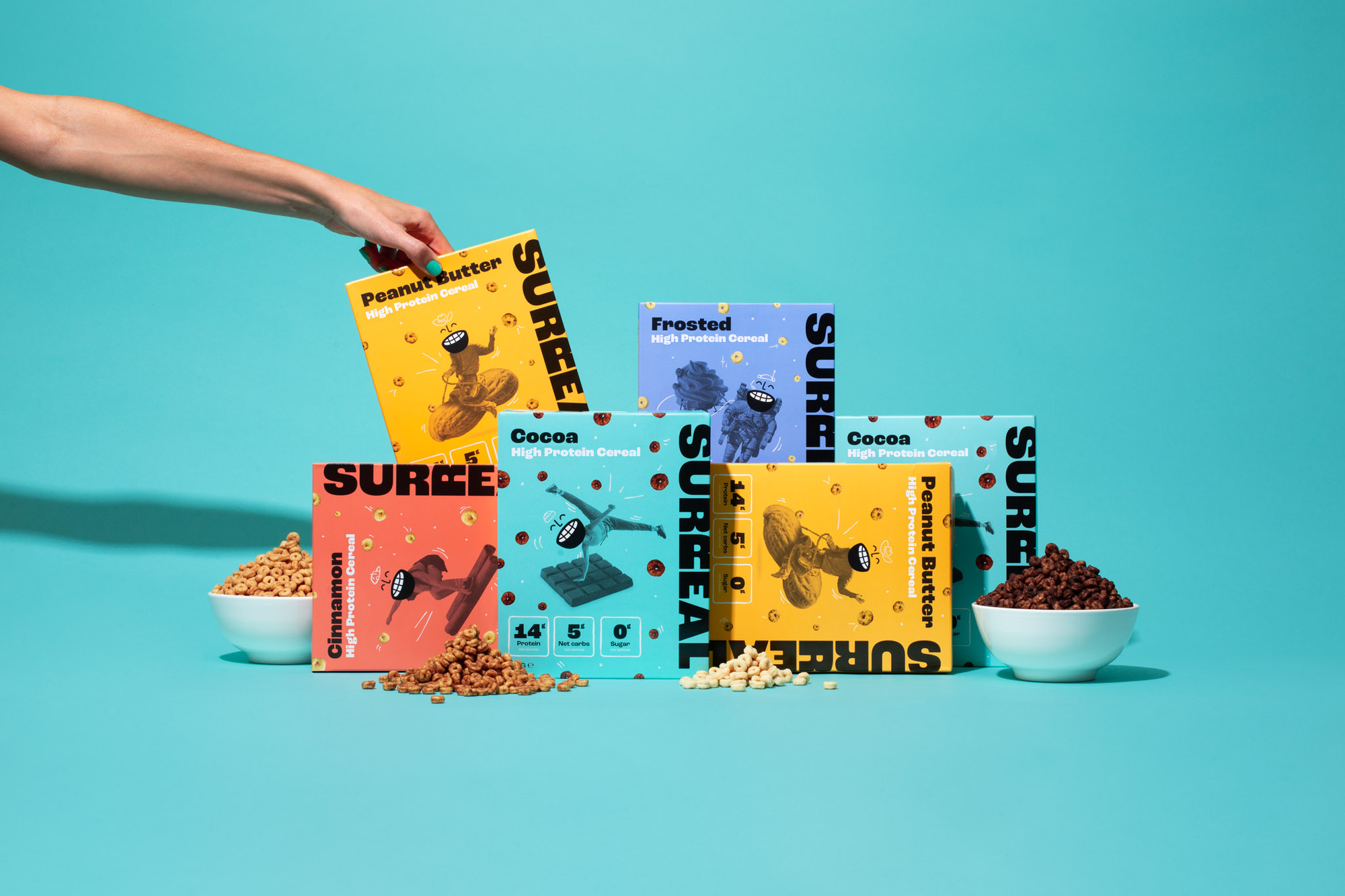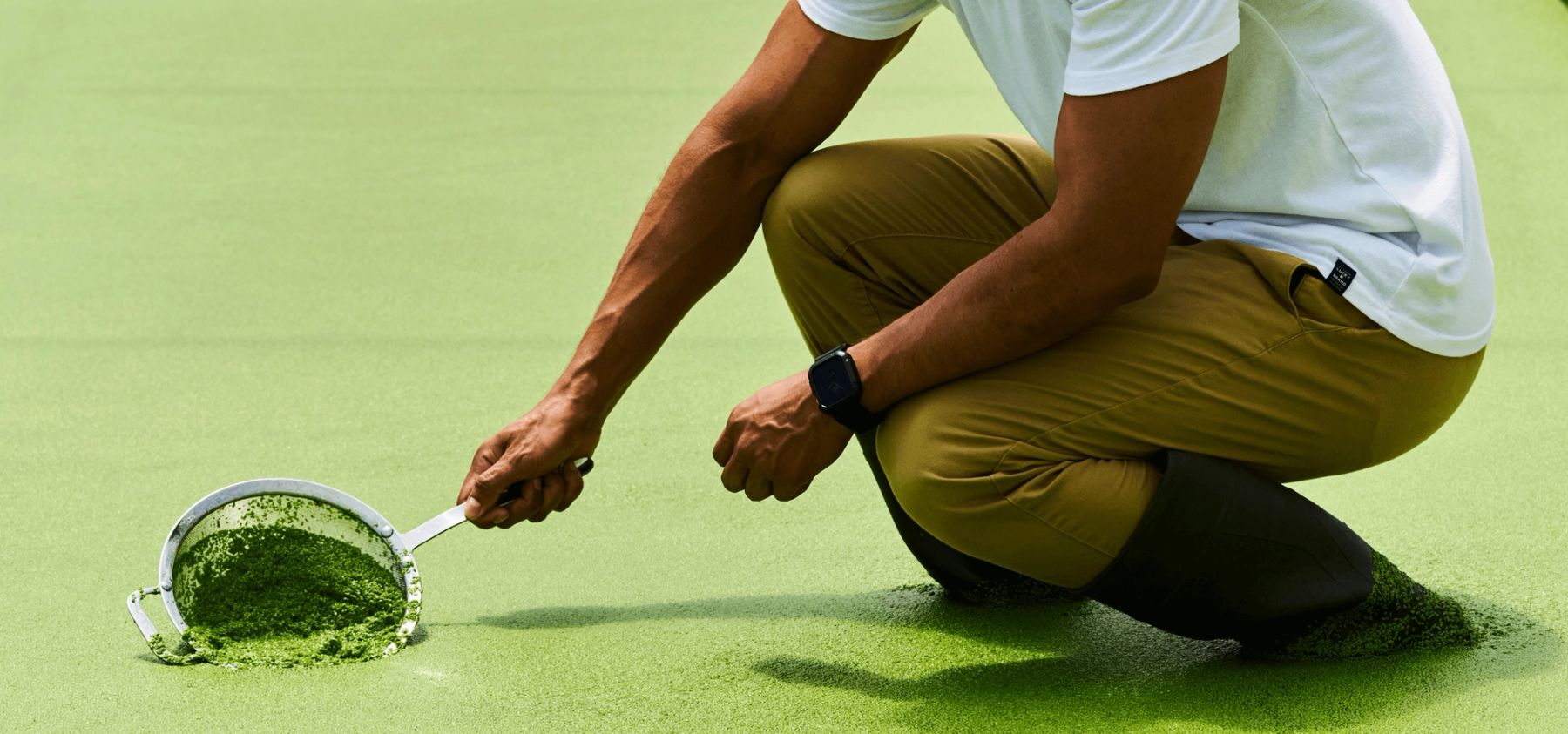Healthy cereal brand Surreal is using a mix of play and nostalgia to take on one of the most competitive aisles in the supermarket, and reinvent the idea of breakfast for adults.


Cast your mind back to the first time a brand made you smile. Chances are, it was fishing in the depths of a cereal packet for the collectable toy that came with it. Kellogg’s invented the in-box toy idea in the late 50s and it spread like wildfire, with cereal brands teaming up with some of the biggest bits of intellectual property around (Star Wars, The Simpsons) to keep kids hooked on the next box. But fast forward a decade or two in your life and the toys, mascots and packaging puzzles have all but disappeared.
“Cereal, as a category, has been amazing at marketing. Everyone can tell you the time they got a free CD with a box. There’s a whole world around it. And most people’s first touchpoint with brands and products is cereal.”
Kit Gammell, co-founder of Surreal
“The cereal you eat as a kid is delicious, full of personality, full of flavour and full of sugar, but you grow up, health becomes important and then cereal becomes insanely dull,” says Kit Gammell, co-founder of Surreal – a new healthy cereal brand. “Cereal, as a category, has been amazing at marketing. Everyone can tell you the time they got a free CD with a box. There’s a whole world around it. And most people’s first touchpoint with brands and products is cereal.”
THE AUFI CONNECTION: SURREAL ARE ONE OF A HANDFUL OF CPG BRANDS THAT WE’VE INVESTED IN THROUGH AUFI VENTURES.
Gammell launched Surreal in 2021 with co-founder Jac Chetland. Both had previously worked at coconut water brand Vita Coco, and helped the business grow from a relative unknown – “back then, soft drinks were basically a chiller with Coca-Cola, water and orange juice” – to a major new category of its own. Gammell says the pair fell in love with the idea of “building something different”, and after leaving Vita Coco started thinking about other categories that were ripe for change. Cereal felt like a natural next step; not only is it the third biggest category in food and drink, but it requires very little ‘education’.
“From a brand perspective, that’s where we got so excited. There’s already this insane amount of emotional connection and nostalgia within cereal – we’re not having to create anything new, we’re just bringing it back but delivering a very adult translation of it.”
Kit Gammell, co-founder of Surreal
“Our challenge with coconut water was to say, ‘Hey, you’ve probably never heard of this, but let me tell you what it is and why it’s good for you. By the way you might not like the taste, but drink it three times and you will’,” explains Gammell. “It’s remarkable that such an amount of education is needed, and it’s incredibly challenging. It means your comms strategy becomes all about education versus anything emotional or brand-building. We liked cereal because it’s the opposite – you speak to anyone and they know what cereal is.
“From a brand perspective, that’s where we got so excited. There’s already this insane amount of emotional connection and nostalgia within cereal – we’re not having to create anything new, we’re just bringing it back but delivering a very adult translation of it.”



Surreal isn’t quite what you’d expect for a healthy, adult cereal choice, but it’s also not the sugar-laden brands people remember from their childhood. Made using plant-based protein it’s high in fibre and low in carbs, as well as sugar- and gluten-free. Surreal offers a range of familiar flavours: cinnamon, frosted, peanut butter and cacao, as well as special limited edition boxes, such as Cookies and Cream. And with its business largely D2C – although it’s also stocked in a growing number of retailers – the Surreal team is able to test and launch new flavours at a pace legacy cereal brands can’t compete with.
“We knew we wanted emotion built into the brand. We didn’t want it to be functional – that was a very conscious decision – and we spent ages thinking, ‘well, what’s the emotion in cereal?’. When you really dig into it, it’s that playfulness and joy.”
Kit Gammell, co-founder of Surreal
But while the recipe is totally different, Surreal’s branding channels the best bits of the childhood experience of breakfast. “The brand basically tries to take all of the cues and playfulness and personality of child cereal and reinvent it, from a product perspective but also from a brand and marketing perspective,” explains Gammell. “We knew we wanted emotion built into the brand. We didn’t want it to be functional – that was a very conscious decision – and we spent ages thinking, ‘well, what’s the emotion in cereal?’. When you really dig into it, it’s that playfulness and joy.
“Our interpretation is that play is an incredibly powerful tool and emotion. As kids we’re fantastic at it – it’s how we learn, develop and grow, and as adults we just stop playing. Adults become really serious and what sits behind the brand is encouraging adults to be more playful. We’re not encouraging them to be kids again, but it’s rediscovering that sense of play that’s so important for imagination, creativity and development.”
“Tone of voice takes time, you have to be consistent, and it needs to be done in-house or it’s never going to last.”
Kit Gammell, co-founder of Surreal
Establishing the right tone of voice – playful and weird, but never too much of either – has been a critical part of building Surreal’s joy-filled brand world. Gammell says the team has made a concerted effort to use verbal expression to set themselves apart. He believes brands often optimise too far in the direction of visuals, and end up having little more than a “copy-paste tone of voice” behind that. “Tone of voice takes time, you have to be consistent, and it needs to be done in-house or it’s never going to last,” he adds.
“When we talk about tone of voice, we always think of the personality. We’re much more concerned with the impression someone will get from the words than the words themselves. So tone of voice guidelines for some brands will say: ‘Don’t say this, say that. Spell this word like this.’ That can become so granular that it’s limiting.”
That’s not to say that the design side isn’t also key, particularly for a brand like Surreal which is in one of the most visually noisy aisles in the supermarket. As Gammell points out, there’s a matter of seconds to grab someone’s attention while browsing – and the pressure’s on when it’s happening in competition with some of the world’s most well-established consumer brands. Ultimately though, he’s confident that creativity will win through.


“It’s not just branding and design, it’s ideas. You won’t be surprised to know that our marketing budget isn’t as big as Kellogg’s, so the only thing that can differentiate us from established competitors is ideas. They’re the things that can have the greatest impact on the consumer.”
Kit Gammell, co-founder of Surreal
“It’s not just branding and design, it’s ideas,” he tells AUFI. “You won’t be surprised to know that our marketing budget isn’t as big as Kellogg’s, so the only thing that can differentiate us from established competitors is ideas. They’re the things that can have the greatest impact on the consumer. They’re also free, and that’s why we put them at the absolute heart of our business, because they’re the only thing that can stand us apart from our competition – and those ideas translate into tone of voice, design, and how you do everything. It’s integral.”



